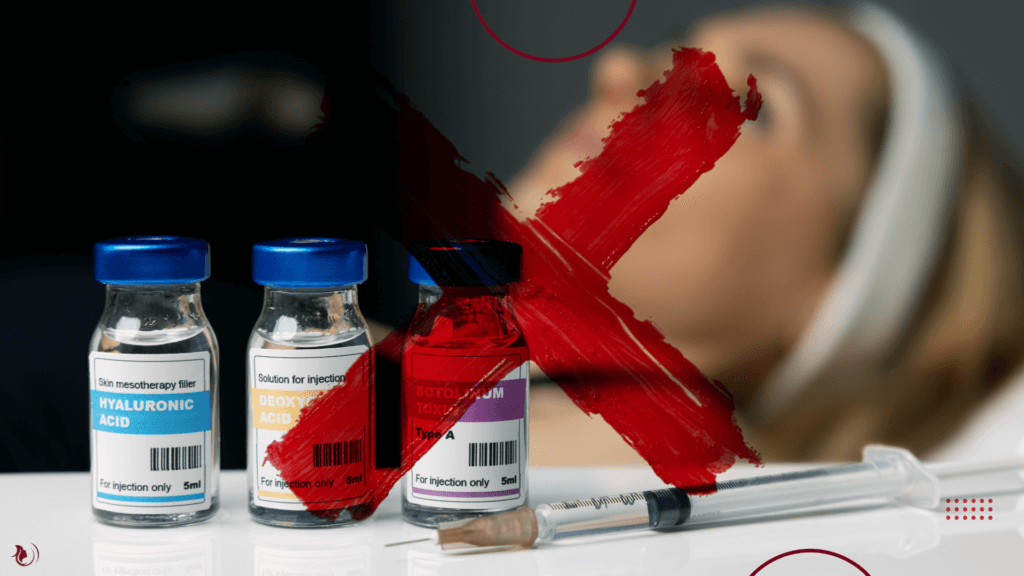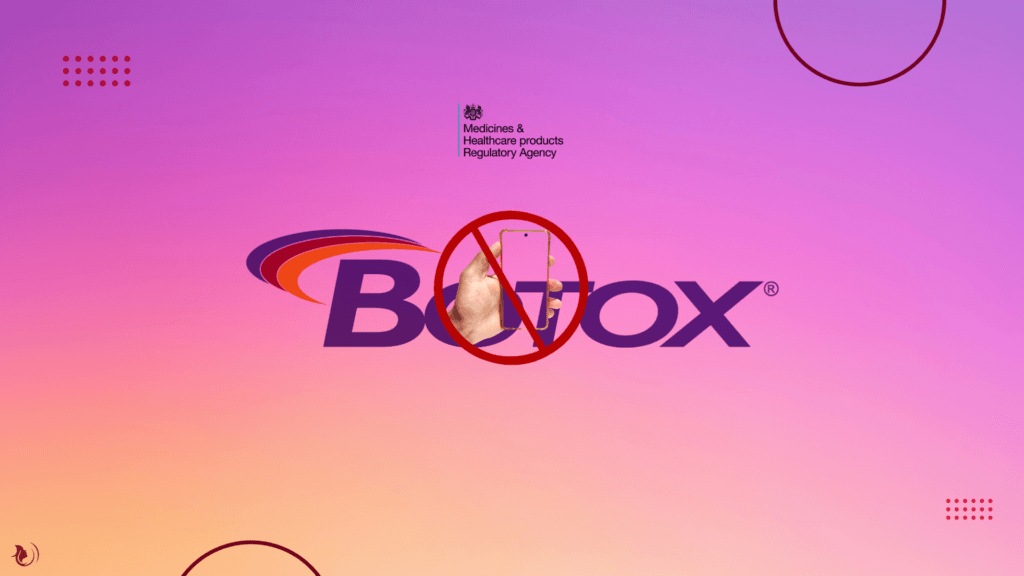If you’re in the aesthetics or weight loss industry, you know that the regulations around advertising prescription-only medicines (POMs) have always been strict. But recent developments have taken things to a whole new level. Until recently, clinics and practitioners could still mention well-known brand names like Botox on their websites. Botox is synonymous with anti-wrinkle injections, which is the most popular aesthetic treatment globally.
That all changed in early 2025, when the Medicines and Healthcare products Regulatory Agency (MHRA) issued an enforcement notice that Aesthetics Today was made privy to. The notice which is targeted to a clinic, effectively suggests banning UK clinics from referencing Botox or other prescription treatments on their website altogether. This move follows a crackdown that initially targeted weight loss injections in 2021 in collaboration with the Committee of Advertising Practice (CAP).
The enforcement notice, titled Advertising of Prescription-Only Weight-Loss Treatments, was issued following a series of rulings by the Advertising Standards Authority (ASA) against clinics like Skinnyjab Ltd, Skinny Clinic, and Skinny Revolution Ltd. back in 2021. These clinics were found to be advertising POMs, such as liraglutide and semaglutide, on Instagram. These medications, which are injectable or oral treatments for weight management, are strictly prescription-only. They should, according to the MHRA, never have been promoted directly to the public.
But it wasn’t just the promotion of POMs that raised red flags. The ASA also found that these clinics were making irresponsible weight loss claims. Things such as promising rapid or excessive weight loss and targeting individuals who were not clinically overweight. This kind of advertising breaches UK advertising codes, because it is seen to exploit body image insecurities. So as an ethical concern.
While the government’s stance is rooted in the need to prevent misleading advertising, the broad nature of the ban has raised concerns. By restricting terms like “anti-wrinkle injections” or “weight loss injections”, the MHRA and ASA are extending their reach beyond just regulating brand mentions. It’s controlling how clinics describe entire treatment categories. Does this sound fair? And is this necessary consumer protection, or a case of regulatory overreach?
How Did We Get Here?

The UK aesthetics and weight loss industry is booming. According to a 2022 report by the British Association of Aesthetic Plastic Surgeons (BAAPS), non-surgical treatments like Botox and dermal fillers have seen a 41% increase in demand over the past 5 years. Similarly, the global weight loss market is projected to reach £295 billion by 2027. Led by injectable treatments like semaglutide gaining popularity.
However, with growth comes responsibility. The MHRA has reported a significant rise in complaints about the illegal advertising of POMs. Particularly on social media platforms like Instagram and Facebook. In 2021 alone, the MHRA received over 1,200 complaints related to the promotion of POMs. That was a 30% increase from the previous year. This surge in complaints has prompted stricter enforcement and a crackdown on non-compliant clinics.
For years, UK aesthetic clinics operated under a clear rule. While advertising prescription drugs was strictly prohibited, they were allowed to mention them in informational content. This meant that clinics could list treatments such as:
- Botox (botulinum toxin) for wrinkle reduction
- Stem cells procedures for facial rejuvenation
- Prescription-only weight loss injections like liraglutide or semaglutide
That changed in 2021 when the MHRA cracked down on so called irresponsible weight-loss ads, issuing an Enforcement Notice banning the direct or indirect promotion of POMs. At the time, the ruling primarily targeted social media promotions. Some businesses irresponsibly marketed prescription weight-loss drugs as quick-fix solutions without proper medical oversight.
Fast-forward to 2025, and the MHRA is now expanding this restriction to the broader aesthetics industry. A complaint letter, issued in February, reinforced the idea that even mentioning Botox on your website and social media, or using broad terms like “anti-wrinkle injections” could now be considered a violation.
This raises a fundamental question. How far is too far?
Confusion and Overreach
CAP has made it clear that non-compliant clinics will face consequences. The ASA has already taken action against several clinics, requiring them to remove non-compliant ads and issue corrective statements. In some cases, clinics have been referred to the MHRA, which has the authority to impose fines, issue warnings, or even prosecute offenders.
For clinics, the stakes are high. A single breach of the rules can result in reputational damage, loss of client trust, and financial penalties. In 2021, the MHRA issued fines totalling over £500,000 to clinics found guilty of illegally advertising POMs. With the new enforcement notice in place, these penalties are only expected to increase.
The MHRA’s latest enforcement has triggered backlash across the aesthetics community. While protecting consumers from misleading claims is crucial, the scope of the new restrictions is extremely broad.
1. Unfair to Clinics & Consumers?
Most aesthetic professionals understand that Botox is a prescription treatment and already follow strict advertising rules. However, banning the mere mention of it creates confusion for consumers.
Botox is a household name. Many patients search for “Botox clinics near me”, and yet under the new rules, clinics can no longer use the term.Even to educate patients about their options. This will force patients to navigate vague, generic descriptions like “wrinkle-relaxing injections” instead of finding the treatment they’re actually looking for. It will also encourage clinics that use poorly regulated non-branded options to cut costs. These unregulated botulinum toxin brands could pose a danger to the public.
2. Restricting “Anti-Wrinkle Injections” Goes Too Far
Banning direct promotion of branded drugs like Botox makes sense. But the MHRA’s attempt to prohibit generic treatment descriptions, such as “anti-wrinkle injections” or “weight loss injections”, is deeply problematic. Unlike specific drug names, these terms refer to treatment types, not brands. Preventing clinics from using them could unintentionally mislead consumers. They may struggle to understand what treatments are available.
This also disproportionately impacts smaller clinics that lack the resources to navigate complex regulatory changes. Major aesthetic chains and medical clinics can afford expensive compliance teams. But independent practitioners may be left struggling to rework their entire marketing strategy.
3. A Grey Area in Regulation: What Can Clinics Actually Say?
With Botox and weight loss injections now effectively blacklisted for marketing, clinics face uncertainty about what they can legally say.
Are they still allowed to mention:
✅ “Wrinkle-relaxing treatments”?
✅ “Injectable rejuvenation”?
✅ “Muscle-relaxing injections”?
Or will these phrases be targeted next? The lack of clarity in the MHRA’s enforcement creates a legal minefield for aesthetic professionals who simply want to inform their patients.
The Impact on the Aesthetics Industry

1. Digital Marketing Challenges
One of the biggest concerns for clinics is the impact on search engine results. With Botox and anti-wrinkle injections now off-limits, businesses will struggle to reach consumers searching for these treatments online. Many rely on organic search traffic to attract new patients, and suddenly removing these keywords could tank their visibility overnight.
Some clinics may try creative workarounds, like using cryptic terms (“wrinklefix” or “frown-free treatments”), but these solutions are neither practical nor consumer-friendly.
2. Patient Education Will Suffer
Clear, educational content is essential for consumer safety. If clinics can’t describe treatments accurately, patients may turn to unreliable sources, like social media influencers, who are not bound by the same regulations.
Ironically, this could increase misinformation, as legitimate clinics are silenced while unregulated online discussions continue unchecked.
3. Loopholes & Alternative Marketing Tactics
With new restrictions in place, some businesses might shift marketing strategies to avoid compliance issues.
Expect to see:
- More in-person consultations. Since websites can’t use the terminology, clinics may push for face-to-face consultations where they can legally discuss treatments.
- Increased focus on skincare & wellness. Many clinics will pivot towards cosmetic skincare treatments (which are less regulated) to sidestep advertising bans.
- Influencer marketing growth. Aesthetic brands may rely more on influencers to discuss treatments informally. Since individuals aren’t held to the same rules as businesses.
Is This Really Protecting Consumers?

The stated goal of the MHRA’s crackdown is to protect consumers from misleading advertising. But in practice, these new restrictions:
❌ Confuse patients by banning the use of widely recognised terms.
❌ Hurt small businesses that rely on digital marketing.
❌ Push discussions underground, making it harder to access accurate information.
Instead of banning essential terminology, a more balanced approach could involve:
✔️ Stronger regulation on irresponsible claims (e.g., clinics promising unrealistic results).
✔️ Mandatory disclaimers on marketing materials to clarify that Botox is prescription-only.
✔️ Aesthetic industry consultation before issuing blanket bans.
Ultimately, regulation should empower consumers, not confuse them.
A Turning Point for UK Aesthetics
The UK’s aesthetics industry is facing a defining moment. The MHRA’s latest enforcement could reshape how clinics operate, forcing a shift away from traditional marketing towards alternative strategies.
For aesthetic practitioners, staying compliant will require adaptation and creativity. For consumers, finding trusted information will become more challenging. One thing is becoming clear. This debate is far from over. “The fight for the ability to advertising aesthetic treatments is only beginning”, said Kostas Alekoglu, CEO of specialist beauty marketing agency, Digital Aesthetics.
How do you feel about the MHRA’s stricter regulations? Is banning terms like “anti-wrinkle injections” an overreach, or a necessary step for consumer safety?
Drop your thoughts in the comments or join the discussion online.


